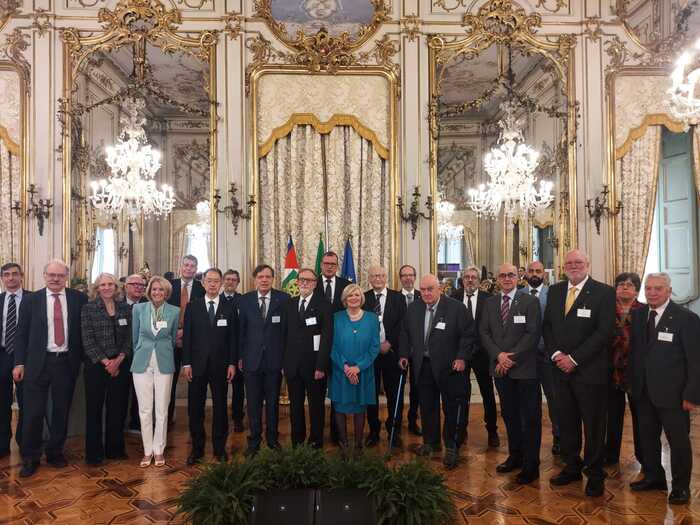They are an unusual couple: Esther Duflo, 46, grew up in France, the mother's doctor, the father's professor of mathematics. Abhijit Banerjee, 58, on the other hand, was born 7,000 kilometers further east and a whole world away, on the border to a slum in Calcutta, India. In spite of their different origins, both of them are asking the same question: Why are not more people making the leap out of poverty, despite all their efforts?
Duflo and Banerjee work at the US elite university MIT, since 2015 they are also married. They are the first couple to have been awarded the Alfred Nobel Memorial Prize for Economics. Honored as third in the league was the American development economist Michael Kremer, 54, a colleague from Harvard.
The decision for the trio is a certain turning point: the highest honor for economists has been awarded in the past years regularly gentlemen mostly older semester - for decades of basic work.
This is different this year, Duflo and Banerjee's book "Poor Economics" was published in 2011 - that's practically yesterday in the world of economic research. They have also devised no theoretical buildings at their desks, but instead the Nobel Prize committee has explicitly awarded them for their "experimental approach to alleviating poverty."
The winners are the best-known representatives of a new school in development economics. The Poverty Action Lab founded by them has now brought together 120 researchers from all over the world. They investigate why traditional development aid funds - building schools, providing microcredits, better informing families - often have frustratingly little effect.
A serving of lentils against vaccine muffle
Which measures work - and which not? To find out, they focus on a factor that has been treated rather neglectfully by traditional economic research for decades: the real human behavior, its small and larger weaknesses.
And they rely on experiments that are otherwise familiar from the pharmaceutical industry. Randomized controlled trials (RCTs) is the name given to this format: In India or Nigeria, for example, arms are randomly divided into two groups: one receives some help, the other does not. This offers significant advantages over traditional observational studies. Otherwise, scientists can only log real processes - and then have to painstakingly determine which factor led to which sequence.
RCTs, on the other hand, give scientists the opportunity to tailor studies to fit a specific question. You can test if their hypotheses are correct. This approach provides partly remarkable results: Schools in Africa achieve better learning outcomes that do not classify students by age, but according to their level of knowledge.
photo gallery
14 pictures
Nobel prize winner for Economics: men, men, a womanIn the Indian state of Rajasthan, in turn, the vaccination rate increased from 6 to 38 percent in children. The reason was simple: after the doctor's visit, each mother was given a food ration of lentils. Actually, their price of 50 cents is out of all proportion to the benefit that a child has through a vaccine. But that's how many people are ticking. The tangible benefit now is often more important than the abstract good in the distant future. Practical side effect: The lenses are much cheaper than elaborate information-education programs on the benefits of vaccination.
In search of the lump of truth
Duflo has also studied the behavior of small farmers in Kenya. Many of them often went into distress because of the difficulty of not groping aid for the purchase of fertilizer until sowing next year. However, as soon as they got help directly in the form of fertilizer rations, they had much less problems with it. " Randomized controlled trials give you the chance to be surprised," says Esther Duflo.
The British Economist put it this way: the new approach "wins lumps of truth from the mud of supposed truths and wishful thinking that characterize the development aid debate".
She wanted to ensure that "the fight against poverty is based on scientific evidence," says Duflo. It is still true today that "the poor are reduced to a caricature of themselves". Even those who wanted to help them had no idea "of the deep roots of what makes them poor." With this approach, the trio succeeded in "completely redesigning" development economics, praises the Nobel Prize committee.
The approach is not undisputed among researchers. Some critics are bothered by the approach of "randomized controlled trials"; the experiments have reduced the needy to guinea pigs.
Criticism from the predecessor
The Anglo-American economist Angus Deaton - himself a Nobel Prize winner in 2015 for his research on poverty - bothers otherwise. He has come to an academic exchange with Banerjee. Deaton warns against "sacralizing" the RCTs, although the samples are often too small for reliable scientific evidence. One has to "take the halo" of the method and see it as "a human thing, with all its faults."
Nobel laureate Duflo, on the other hand, hopes that her method could also be used in other fields - far beyond traditional development research. She would like to use them to fathom the roots of the populist wave in the West. In rich countries, "many people are deeply concerned about their position in the world, they think they have lost their dignity and no longer have the place they think they deserve," she said after the award was announced.
One has to find out what "the sources of this problem" are - and what to do about it.


/cloudfront-eu-central-1.images.arcpublishing.com/prisa/WWFMH3RJQFHGDLP4L4JLWOGC6Y.jpg)




/cloudfront-eu-central-1.images.arcpublishing.com/prisa/4BBEMCOSQFE7LNGAOSXIRE24NE.jpg)

